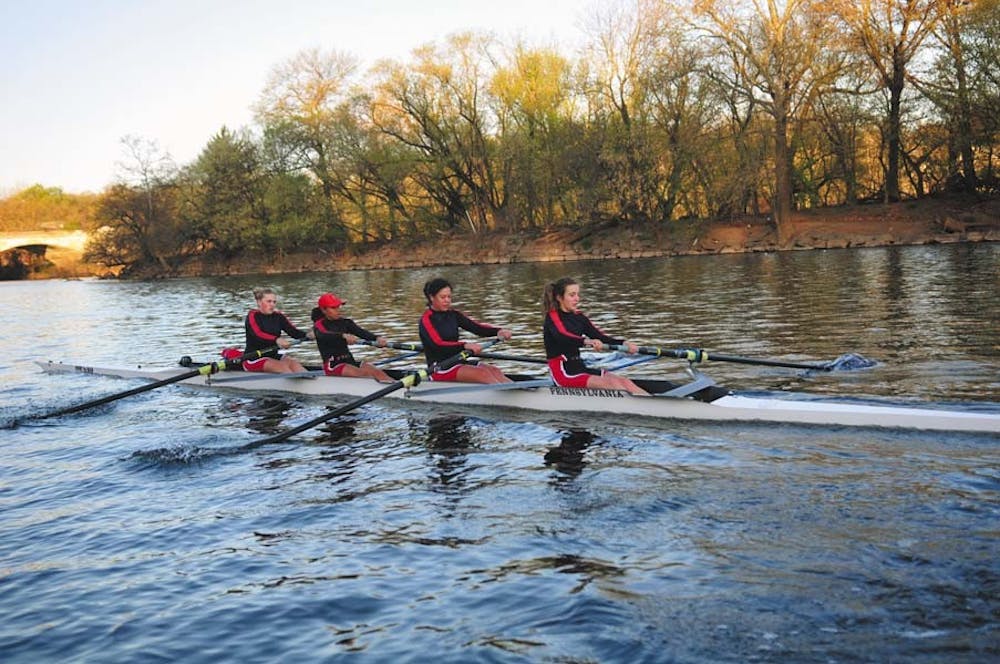
“Never be afraid to give up the good to go for the great.”
A poster with that phrase sits in the women’s rowing team’s locker room, and is meant to spur on the ladies before their three-hour practices at six in the morning.
Recently, however, a fair number of rowers have taken that quote and given it a new meaning, as they left the sport behind.
Rowing is one of the few varsity sports on campus that allows walk-ons without hesitation at the beginning of each year.
Quite often, though, numerous students will try out rowing for a while, decide its too much, and quit within weeks. These students usually come in with no expectations whatsoever.
The same mantra does not hold true for students with rowing experience.
“We expect those students to come on, make us faster,” coach Mike Lane said. “There’s an expectation that they’ll be here for four years. Of course, there are injuries, there’s burnout … but we’re disappointed if we lose a kid within her four years.”
In the last two years, 11 of those rowers with pedigree have decided to walk away from the team.
One of these ex-rowers, who wished to stay anonymous due to her connection to members of the team, found herself pulled towards other things.
“I became more involved in my major, more involved in other academic activities,” she said. “I was being pulled in too many directions and I had to make a choice.”
She hasn’t lost her love for the sport, though. In fact, it was only due to the strength that she had found while rowing that she had enough confidence to walk away.
Lane understands the pressures of life at Penn. But in his mind, rowing must come second, only after academics.
If a particular rower doesn’t feel as though she wants to make that sacrifice, then Lane believes that “it might be better if we parted ways.”
This was the case for the aforementioned ex-rower, who still maintains friendships with numerous ex-teammates.
For her, the worst case scenario, having to choose between her rowing friends and her other friends, never materialized.
“They hate me as a teammate, but they still like me as a person,” she said.
Fellow ex-rower Noor Bosch, in contrast, never felt that comfort, saying that the time commitment made it “hard to maintain the friendships I had made outside of rowing.”
All the while, the dual pressures of being both student and athlete became too much to bear.
“There are plenty of athletes who manage to balance it well,” Bosch said. “My hat’s off to them.”
Since quitting the team, both have found themselves happier than they were before.
Bosch called it “the best life decision I’ve made since I decided to apply to Penn at all.”
Both insisted that they aren’t trying to scare people away from the team.
“I’m definitely not trying to persuade anyone to quit,” Bosch said.
Her compatriot likened playing the sport to a long-term relationship.
“You want to idealize the good times,” she said. “Because it was such a good experience and there was so much that you took from it — the skills, the dedication, and what it means to be committed. But now, I’m really excited to take those things that made me who I am, and apply them to other parts of my life.”
Bosch has certainly lived out that sentiment. Since she stopped rowing, she has started back up the Rock Climbing Club and has made it her “main goal to foster a community — a support group — for people who are hooked on this sport and are looking for peers who share their love.”
Having given up the good, she’s now ready for the great.
SEE ALSO
Women’s rowing copes without proper practice facility
Walk-on rowers reach highest levels of success
Penn rowing to perform for the masses
The Daily Pennsylvanian is an independent, student-run newspaper. Please consider making a donation to support the coverage that shapes the University. Your generosity ensures a future of strong journalism at Penn.
DonatePlease note All comments are eligible for publication in The Daily Pennsylvanian.




